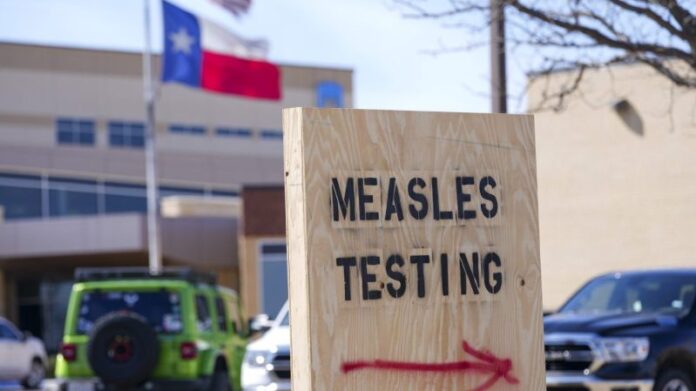(NewsNation) — A new study warns the U.S. could see millions of new measles cases over the next 25 years if vaccination rates continue to fall.
The study, published in JAMA, used modeling to forecast the number of measles cases in several scenarios, including vaccination rates holding steady, rising or falling.
Measles was officially eliminated in the U.S. decades ago thanks to the Measles, Mumps and Rubella (MMR) vaccine.
But as more people have refused to vaccinate their children despite decades of evidence showing the MMR is effective and safe, measles has been making a comeback, with a current outbreak already accounting for hundreds of cases.
If vaccination rates hold steady at today’s level, researchers predict 851,300 cases of measles over the next 25 years.
But if vaccination rates drop just 10%, there could be 11.1 million measles cases in that same time frame. If vaccination rates drop by 50%, there could be 51.2 million cases of measles over the next 25%.
Assuming that vaccination rates fell at the same level for all childhood vaccines, measles isn’t the only dangerous, previously eliminated disease that could make a comeback.
Cases of polio and rubella could also rise, leading to a potential 10.3 million hospitalizations and 159,200 deaths, along with thousands of cases of post-measles neurological complications, rubella-related birth defects and post-polio paralysis.
Researchers warn that should these diseases become endemic again, it would take time to eradicate them a second time, even if more people began getting vaccinated after seeing the effects of these preventable illnesses.
Dropping vaccination rates would also impact herd immunity, where those too young to get vaccinated and immunocompromised people would also be at risk of infection along with those who chose not to get vaccinated.
Although vaccines have a record of safety that goes back decades and a study that falsely linked autism to the MMR vaccine was retracted and debunked, public figures have continued to spread doubt about routine vaccination.
That includes Secretary of Health and Human Services Robert F. Kennedy Jr., who has on occasion made statements supporting the MMR but has also repeatedly raised doubts about vaccine safety. He has also promoted diet and vitamin A as methods to prevent measles despite scientific evidence that they do not have any impact, and the only way to prevent measles is by being vaccinated.
Measles is a highly contagious disease with possible severe complications. One in five unvaccinated people who get measles will be hospitalized, and 1 in 20 children with measles will develop pneumonia, which can be deadly.
About one in 1,000 children with measles will develop encephalitis, which can lead to permanent deafness or intellectual disability, and 1 to 3 of every 1,000 children with measles will die from the disease.
Measles can also cause a rare complication, subacute sclerosing panencephalitis, which is fatal and appears seven to 10 years after recovery from measles. Roughly seven to 11 children out of every 100,000 who get measles will develop SSPE.
